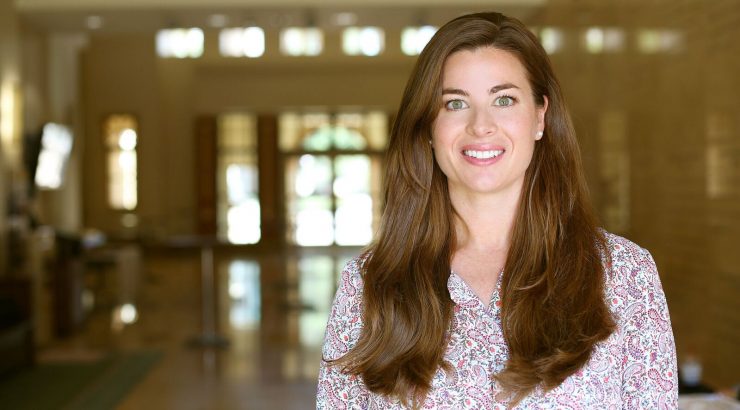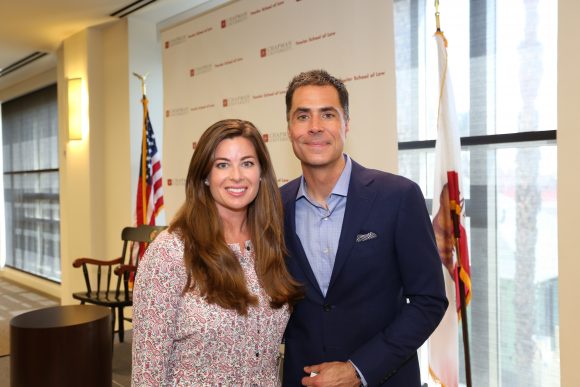
Fowler School of Law Alumna Among Forbes’ ‘World’s Most Powerful’ Sports Agents Diana Day (J.D. '07) focuses on athletes' brands.
June 4, 2018
Photographed on the sidelines with NBA star James Harden, Diana Day (J.D. ’07) occasionally has been confused by gossip-hungry fans for a girlfriend.
That is part of the background of sexist assumptions Day has overcome in a high-trajectory career negotiating contracts for professional athletes: Last year, she became the first woman cited by Forbes as one of the World’s Most Powerful Sports Agents, at No. 30.
The savvy Day leveraged her background as a UCLA athlete – she was a member of three NCAA championship water polo teams – along with key connections she made at Chapman University’s Dale E. Fowler School of Law to launch a career with sports agencies while still a ‘3L.’ A decade later, Forbes estimated she played a role in landing $22.5 million in 2017 commissions.
Law School Changed Her Plan
Day once expected to go a very different direction.
“I always knew that I had a passion for sports, but I had my sights set on being a sports broadcaster,” she said.
As a student at UCLA, Day interned at Los Angeles television stations KCBS and KCAL.
“I loved it,” she said. But two things bothered her. One was the typical career path: Start as a sportscaster in a smaller media market in the hinterlands, pay your dues as a one-man band — or “one-woman band,” Day said with a laugh – and move up the ladder.
The other issue was more unsettling: There were stories at the time of women sportscasters inappropriately involved with athletes, and not-very-subtle suggestions that the casting couch was alive and well in sports broadcasting.
“I just thought, ‘This isn’t good,’” Day said. “I didn’t like the stigma that was attached to women. So I decided to go to law school to gain credibility as a female in the sports world.”
“When I started working with Diana as a student, I could immediately tell that she was going to be incredibly successful. She’s smart, strategic, dynamic, and hardworking. Diana is a real force in the sports world, and we couldn’t be more proud of her and all that she has accomplished.”
— Fowler School of Law Dean Matt Parlow
At Chapman’s Fowler School of Law, a new avenue emerged. Day did some work for Athletes First, a prominent Orange County sports agency with strong ties to UCLA, and discovered her legal skills and easy affinity with athletes helped her in recruiting clients, among them second-round NFL pick John Beck, a quarterback from Brigham Young.
Her big break came after Fowler Law classmate Kenny Schwarz (J.D.’05) insisted Day needed to meet his new brother-in-law: Turned out, Kenny’s sister Kristin, a pediatrician, had married Rob Pelinka — now general manager of the Los Angeles Lakers but then a player agent whose clients included Kobe Bryant. Before Day finished law school, she was working closely with Pelinka, eventually co-founding Landmark Sports Agency with Pelinka and Brandon Rosenthal.

Diana Day (J.D. ’07) and Lakers General Manager Rob Pelinka
“We had a philosophy to really try to find people that were dedicated to excellence and had what I call ‘Swiss Army knife’ skills,” Pelinka said after speaking at Fowler’s 2018 Entertainment and Sports Law Symposium in March. “Diana, I knew, was a person of integrity who was very intelligent and had a legal mind. She had a good grasp of branding and marketing. So she had skills that I knew would be great in the sports industry.”
From Contracts to Branding
When Pelinka left for the Lakers last year, Day and her colleagues became the lead agents for the agency’s clients. But this spring, she also left Landmark, negotiating an exit to focus on her unique vision for players’ brands.
Recognizing and maximizing athletes’ endorsement potential is Day’s specialty, and there’s no better example than her work with the Houston Rockets’ Harden, winner of the 2018 NBA Most Valuable Player Award.
The quirky, bearded Harden is the star of ads for companies including Foot Locker, Adidas, State Farm, video-game maker Electronic Arts, and most unexpectedly, a candy, Trolli gummies. His annual marketing income by Forbes’ estimate: $20 million.
One of the home runs was a deal with EA Sports that Day worked on for 18 months.
“They signed him across all sports, in a way that they’ve never done with anyone before,” Day said. “He was on the cover of NBA Live, which is an EA game. He’s also in the FIFA game, and he was the star of the Madden 18 commercial.
“Out of that one deal, James was featured in four national and international commercials in less than a year,” she said.
Connecting Harden with sports fans only made sense, but Day saw beyond that.
“What people didn’t realize about him, because they just saw his beard, is that he’s actually a kid at heart,” Day said. “I wanted the public to see this side of him, so I worked with Foot Locker back in the day to create a funny commercial between James and [NBA player Russell Westbrook], and that commercial was such a success it has helped drive the style of Foot Locker commercials for the last six years or so. Footlocker did a great job showcasing his fun loving, comedic personality.”
The unexpected hit was Ferrara Candy Company, which owns Trolli, maker of flavored gummies.
“James loves those,” Day said. “It took me nine months to convince this candy company that had never really done a celebrity deal that they needed to sign James Harden, of all people, to a long-term partnership. To this day, I think that deal has been the most exciting I’ve done because it took a while to get them to do it but once they did it, they were all in and have been great partners of his. They’re a funky, weird, quirky brand, and so is James. The marriage was perfect.”
Trolli has made candies to resemble Harden’s beard and even his shoes.
“The partnership has been very successful for both parties,” Day said, “especially because it opened an entirely new demographic of sports fans to Trolli.”
A New Vision
Day is in the midst of a pivot, or a timeout to reset her game plan, if you will.
“I don’t think many people have an opportunity – I’m 15 years into a career – to stop and pause and reset and say, ‘What do I want to do for the next phase of my life?’” Day said.
“I see a change in the industry. I feel like the majority of the past 20 years, agents have been mainly focused on the ‘show me the money’ moment that athletes have with regards to their sport’s contracts, maybe thanks to the movie ‘Jerry Maguire.’”
“Today’s professional athlete is so much more than just an athlete — they’re actually a brand. They’re a company, and they just happen to play a sport very well. And if that brand or that company is massaged and molded and shepherded the right way over the course of a player’s playing career, it’s going to be enough for the rest of their lives. And basketball or football will have just been a period of time in their life, but the rest of their legacy will continue on.”
With rookie pay scales now set in the NBA and NFL, Day anticipates a transition toward athletes wanting agents that are more focused on brand-building than just the traditional player contracts.
“I do see an industry shift, and I’d like to be at the forefront of it.”

